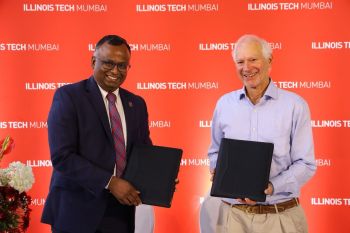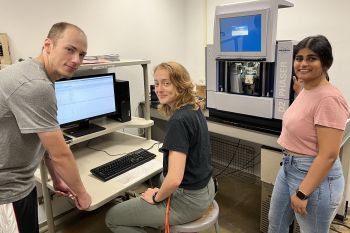Illinois Tech Assistant Professor Awarded Funding to Stop Spread of ‘Forever Chemicals’ into Waterways
David Lampert’s project aimed at finding solutions to halting movement of PFAS in water resources receives phase II funding in EPA competition

CHICAGO—January 4, 2023—Illinois Institute of Technology (Illinois Tech) Assistant Professor David Lampert was recently awarded funding by the U.S. Environmental Protection Agency’s People, Prosperity, and the Planet (P3) Student Design Competition for a project to stop the spread of “forever chemicals” into waterways. Lampert’s project—one of just three nationwide selected for phase II funding—focuses on preventing the movement of perfluoroalkyl and polyfluoroalkyl substances (PFAS) and is aimed at finding solutions that can be implemented on a large scale.
PFAS are a class of chemicals that have been used in a wide range of commercial products, including non-stick pans and shampoo, since the 1960s. Some types of PFAS have been linked to negative health impacts, including cancer, and are referred to as “forever chemicals” because they do not break down in nature. The use of some types of PFAS have decreased, but many still show up in products.
“If you take a blood sample of basically anyone and measure it, you can find a detectable level of these PFAS compounds,” said Lampert.
Lampert is leading a team of students in a project that will test various materials for their ability to capture PFAS as it moves. The team will also include students with business, social science, and entrepreneurial expertise as the project progresses.
Phase I funding from the EPA’s P3 project allowed Lampert and his team to conduct a pilot study, which involved designing a laboratory experiment to track the movement of PFAS through soil and groundwater over time and examine the ability of various materials to contain the pollution and protect surface water resources.
For phase II, Lampert plans to add water columns and worms to the soil system to see how water flow and animal burrowing impact the movement of PFAS. He will also test the soil for additional types of PFAS and study how worms bioaccumulate the compounds, which is important for understanding how PFAS spread to humans through bioaccumulation in fish. These findings will help Lampert identify and test potential intervention strategies for stopping the movement of PFAS.
“There’s a complicated hydrological-environmental modeling question there to try to understand this whole process of how the PFAS gets from a contaminated area to the receptors and people who might be exposed to it,” said Lampert. “Our goal is to find a solution that can be implemented on larger scales.”
Lampert’s team also plans to conduct a field test at an existing PFAS-heavy site. The ultimate goal of the project is to develop and demonstrate effective methods for preventing the movement of PFAS into water resources, improving water quality and protecting human health.
“I’m trying to understand what processes are happening in our water systems and trying to figure out how we can do better from an ecology point of view, a human health point of view, and sustainability point of view,” Lampert said.
Disclaimer: This content was developed under Assistance Agreement No. SU840180 and SV840421 awarded by the U.S. Environmental Protection Agency to David Lampert. It has not been formally reviewed by EPA. The views expressed in this document are solely those of the authors and do not necessarily reflect those of the Agency. EPA does not endorse any products or commercial services mentioned in this publication.
David Lampert, “Sorbent-Amended Caps for PFAS-Contaminated Sediments,” Environmental Protection Agency; Awards Number SU840180 and SV84042
Photo: Assistant Professor David Lampert (provided)
Illinois Institute of Technology
Based in the global metropolis of Chicago, Illinois Tech was born to liberate the collective power of difference to advance technology and progress for all. It is the only tech-focused university in the city, and it stands at the crossroads of exploration and invention, advancing the future of Chicago and the world. It offers undergraduate and graduate degrees in engineering, computing, architecture, business, design, science and human sciences, and law. Illinois Tech students are guaranteed hands-on experiences, personalized mentorship, and job readiness through the university's one-of-a-kind Elevate program. Its graduates lead the state and much of the nation in economic prosperity. Its faculty and alumni built the Chicago skyline. And every day in the living lab of the city, Illinois Tech fuels breakthroughs that change lives. Visit iit.edu.
Armour College of Engineering
Armour College of Engineering has been educating world-class engineers since the university’s founding in 1890. As future engineers who will innovate in the twenty-first century, Armour students learn the principles of the profession and work in an interdisciplinary environment that emphasizes hands-on learning, teamwork, and leadership, all through the lens of our four engineering themes—water, health, energy, and security—that highlight issues vital today and in the future. Armour is home to five departments and nine ABET-accredited undergraduate majors, which provide a wide breadth of exciting programs from which to choose. Illinois Tech alumni have advanced to careers as presidents of companies and professors at major universities—and have become members of the National Academy of Engineering, the highest distinction in the field.
Media contact
Kevin Dollear
Communications Manager
Illinois Institute of Technology
Cell: 773-860-5712
kdollear@illinoistech.edu




